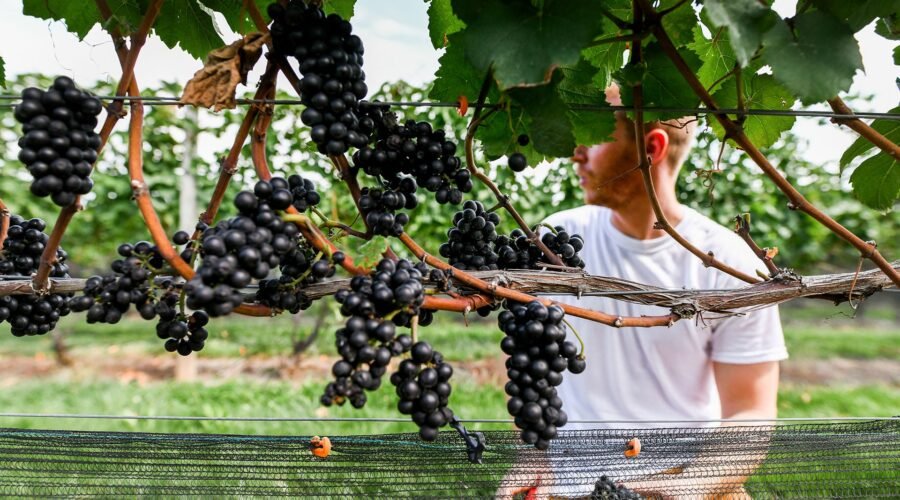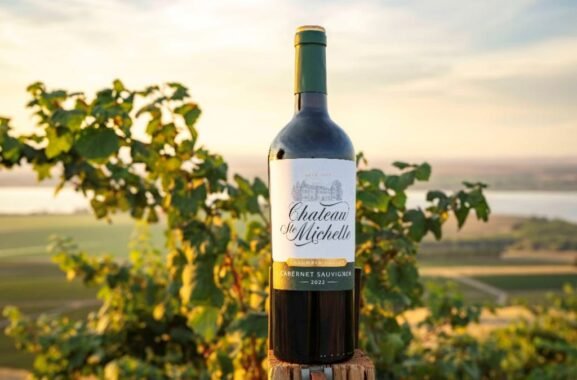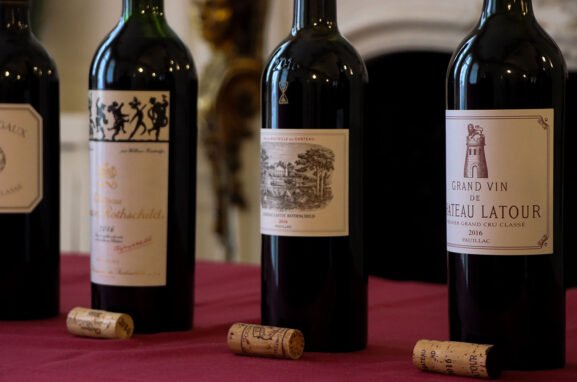Culture: Wine in New Jersey? Garden State Producers Want to Be Taken Seriously
The New Jersey Turnpike’s purpose is to shuffle people and goods back and forth from New York City to Philadelphia as well as other points north and south. Vehicles barrel up and down the infamous highway at a fast clip; travelers can take in some industrial sights (and smells), from the many factories in North Jersey to the shipping ports of Newark. But the Turnpike can also deliver people to rolling fields and vast farmland worthy of the region’s Garden State moniker. One need only take an exit.
On a recent hot and humid late summer day, I was part of a group of travelers driving down the Turnpike. We left Manhattan around 10 a.m., and after a couple of hours, exited onto a county road and finally a country road. The area was rural and the topography flat. We were headed for White Horse Winery. I’d be lying if I said I didn’t feel disoriented. Wine? In New Jersey?
In fact, there are more than 50 licensed wineries in the state, with more on the horizon. The Garden State Wine Grower’s Association, a non-profit and advocacy membership group that works closely with the state’s tourism arm, is working to advance the wines here.
“We’re wonderful at what we do,” says Devon Perry, executive director of the Grower’s Association. “Our wines are intertwined with beaches and history—New Jersey has the perfect combination of agro-tourism that allows families, friends and individuals to get lost in the vines.”
New Jersey wine’s battle for acceptance is, in large part, a public relations issue. Mention “New Jersey” and “wine” in the same sentence and you’re bound to receive some puzzled reactions. But area wine professionals say it’s only a matter of time before that changes.
“It’s a major challenge, but it’s really gratifying when people taste the bottle and say, ‘Wow, I didn’t expect this,’” says Scott Donnini, owner of Pilesgrove’s Auburn Road Vineyard, which celebrates 20 years in October.
It’s not just out-of-state oenophiles that need convincing. Even locals are skeptical, admits Mike Beneduce, owner and winemaker at Beneduce Vineyards in Pittstown. “We realized that the only way to do that is to get people to come out to the winery and see and taste for themselves,” he says.
As proof of New Jersey wine’s ascendance, Perry and others also point to the 2012 Judgement of Princeton, in which the state’s wines were compared in a blind tasting with French wines. Jersey came out swinging: Although a French wine took the top prize in the white category, all three runners up were New Jersey Chardonnays.
You May Also Like: Garden State Greats: A Guide to New Jersey-Made Spirits
Some New Jersey wine facts: The state has four distinct American Viticultural Areas (AVAs): Central Delaware Valley, Cape May Peninsula, Outer Coastal Plain and Warren Hills. Across them, you’ll find a wide mix of grapes planted, from vinifera (Chardonnay, Cabernet Sauvignon, Merlot, etc.) to hybrids (a cross between American and European grapes) to sweet fruit wines. Which is to say, a little something of everything.
Some winemakers question whether that’s a good thing. Beneduce is part of the group of winemakers and winery owners behind Winemakers Co-Op, which promotes the fine wine industry here. He says that he has “nothing against” growing hybrid grapes, noting his winery grows Chambourcin—an extremely popular red grape that is widely grown in the state. However, he worries that focusing on hybrids could be “an additional hurdle” in changing the narrative about Garden State wines. After all, hybrids don’t have the name recognition as vinifera varieties, which could make New Jersey wine an even tougher sell.

Other winemakers say hybrids have an important role to play in the state’s future. “There’s really good potential [with hybrid grapes],” says Brock Vinton, owner of White Horse Winery in Hammonton. “The hybrid grapes are more resilient to climate change.” Vinton works with the hybrids Traminette (a child of Gewürztraminer), Vidal Blanc and Chambourcin to create “high-quality, Old World-style wines.”
At nearby Bellview Winery in Landisville, Chambourcin is grown alongside another hybrid grape Cayuga White. But sweet wines, made from blueberries and cranberries, are also a major focus. So is dandelion wine made from foraged flowers, which it’s produced for decades.
Sweet wine, though perhaps less attractive to some drinkers, is a fact of life here. Donnini might say it best: “We do grow sweet wine. It helps keep the lights on. The hope is the audience will evolve with you.”
The sector is indeed evolving. New Jersey Lieutenant Governor of Tahesha Way, who joined our group tour in person, revealed that the wine industry is the “fastest growing division of agriculture” in the state, adding that its economic impact on tourism and travel was breaking records.
Part of the appeal of growing grapes and making wine in New Jersey is the newness of it. “We get to be the pioneers,” says Donnini. “No one is telling us what kind of grapes we can grow and that’s kind of cool. We’re building it from the ground up.”
New Jersey Wineries to Know

Beneduce Vineyards, Pittstown
Central Delaware Valley AVA
Mike Beneduce is the owner and winemaker at this impressive winery in Hunterdon County, just about an hour west of NYC. Open since 2012, Beneduce makes both traditional and experimental wines in styles the winery calls “classic” and “crafted.”
In the classic category, Beneduce is known for its Rieslings and Blaufrankisch varietals. In crafted, Beneduce aims to reach a younger and more adventurous audience with juicy Gewurztraminer pét-nats and its patented “Chambrusco,” a dry frizzante style wine made from Chambourcin.
“I want to try something new and that sense of adventure is starting to permeate our customer base here,” he says. “Culling ideas and concepts from the fringes is really attractive to me.”
Auburn Road Winery, Pilesgrove
Outer Coastal Plain AVA
Scott and Jules Donnini were attorneys in Philadelphia who bought a farm outside the city “never having plowed a field in our lives.” Two decades later, Auburn Road makes many different types of wine from both vinifera and hybrids varietals, as well as sweet wines. The goal is to reach all types of drinkers.
“Fine wine drinkers, we get plenty of those people. But if you’re the casual wine drinker and you don’t know much about it and tannin freaks you out, we have that, too,” says Scott Donnini. “We try to make those every bit as good as the dry- and semi-dry wines.”
They’re particularly proud of a dry rosé from the Sangiovese grape. “It’s amazingly good: an Italian grape in New Jersey made it the Provence style!” says Donnini.
White Horse Winery, Hammonton
Outer Coastal Plain AVA
Owner Brock Vinton’s father tasted a wine from New Jersey many decades ago and couldn’t believe the quality. It’s something Vinton remembered after leaving a career in engineering to pursue wine. After working in Beaujolais, he eventually opened White Horse. He sees his work as a “badge of honor.”
“All the time people say, “Wow, this is from New Jersey?’” I can almost predict it,” he says. “There’s a feeling that we have something to prove and we can. Things grow very well in New Jersey.”
At White Horse, visitors can sample Albariño, unoaked Chardonnay and Cabernet Franc wines. The most popular is a tart Painted White Estate blend made with White Cayuga, Vidal Blanc, Traminette and Cayuga White grapes.
Published: November 9, 2023


